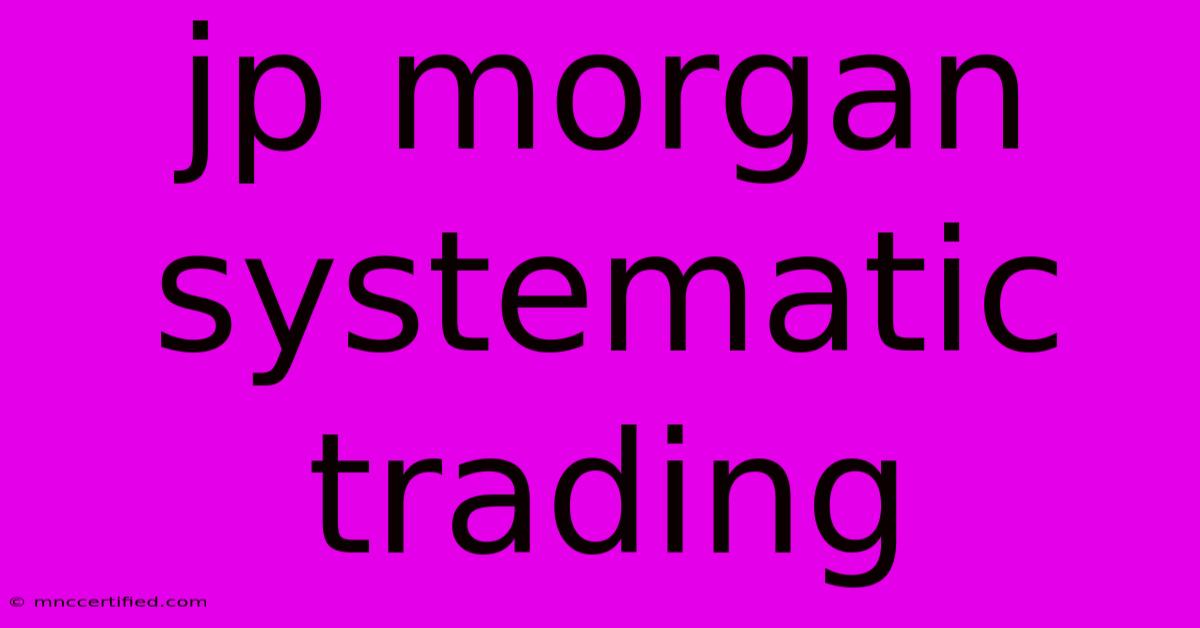Jp Morgan Systematic Trading

Table of Contents
JP Morgan Systematic Trading: A Deep Dive into Algorithmic Strategies
JP Morgan, a global financial powerhouse, is heavily involved in systematic trading, leveraging advanced algorithms and quantitative models to execute trades across various asset classes. Understanding their approach offers valuable insights into the complexities and potential of this sophisticated trading strategy. This article delves into the intricacies of JP Morgan's systematic trading, exploring its methodologies, benefits, risks, and its position within the broader financial landscape.
What is Systematic Trading?
Systematic trading, also known as algorithmic trading or automated trading, relies on pre-defined rules and computer programs to execute trades. Unlike discretionary trading, which relies on human judgment and intuition, systematic trading eliminates emotional biases and allows for rapid, high-frequency transactions. JP Morgan's systematic trading likely incorporates a diverse range of algorithmic strategies, employing complex mathematical models to identify and capitalize on market inefficiencies.
Key Characteristics of JP Morgan's Likely Approach:
- Quantitative Models: Sophisticated statistical models analyze vast amounts of historical data to predict future market movements and identify profitable trading opportunities. These models are constantly refined and updated to adapt to changing market conditions.
- High-Frequency Trading (HFT): JP Morgan, like many other major financial institutions, is likely a significant player in HFT, executing thousands or even millions of trades per second to exploit tiny price discrepancies.
- Statistical Arbitrage: This strategy involves identifying and exploiting temporary price discrepancies between related securities, such as stocks within the same sector or options and their underlying assets.
- Risk Management: Robust risk management systems are crucial for systematic trading. JP Morgan likely employs sophisticated risk models to monitor and control exposure to various market risks, including market risk, credit risk, and liquidity risk.
- Backtesting and Optimization: Before deploying any algorithmic trading strategy, rigorous backtesting is essential. JP Morgan likely uses historical data to simulate the performance of its algorithms, optimizing parameters to maximize profitability and minimize risk.
The Advantages of JP Morgan's Systematic Trading Approach
The adoption of systematic trading provides JP Morgan with several key advantages:
- Speed and Efficiency: Algorithmic trading allows for incredibly fast execution of trades, capitalizing on fleeting market opportunities unavailable to human traders.
- Objectivity and Discipline: Systematic trading eliminates emotional biases that can cloud judgment and lead to poor trading decisions. Algorithms follow pre-defined rules, consistently executing trades regardless of market sentiment.
- Scalability: Algorithmic strategies can be easily scaled to manage large volumes of trades across multiple markets and asset classes.
- Data-Driven Decision Making: Systematic trading leverages vast datasets and sophisticated analytics to make data-driven decisions, enhancing the accuracy and effectiveness of trading strategies.
The Challenges and Risks of Systematic Trading
Despite its numerous benefits, systematic trading also presents several challenges and risks:
- Model Risk: The accuracy of algorithmic trading strategies depends heavily on the underlying models. If the models are flawed or fail to adapt to changing market conditions, substantial losses can occur.
- Technological Risks: System failures, cybersecurity breaches, and other technological issues can disrupt trading operations and lead to significant losses.
- Market Volatility: Unexpected market events can disrupt even the most sophisticated algorithms, potentially leading to significant losses.
- Regulatory Scrutiny: Systematic trading is subject to increasing regulatory scrutiny, particularly regarding issues such as market manipulation and fair trading practices.
JP Morgan's Position in the Broader Market
JP Morgan's systematic trading activities significantly influence the broader financial markets. Their high-frequency trading operations contribute to market liquidity, while their algorithmic strategies can impact price discovery and volatility. Understanding their role is crucial for anyone seeking to navigate the complexities of modern financial markets.
Conclusion: The Future of Systematic Trading at JP Morgan
JP Morgan's commitment to systematic trading reflects a broader trend in the financial industry toward greater automation and data-driven decision-making. As technology continues to evolve and market dynamics shift, we can expect JP Morgan to continue refining its algorithmic trading strategies, leveraging new technologies like artificial intelligence and machine learning to enhance their effectiveness and profitability. The future of systematic trading at JP Morgan, and indeed the broader financial industry, is likely to be characterized by increasing complexity, sophistication, and regulatory oversight.
Keywords: JP Morgan, systematic trading, algorithmic trading, high-frequency trading, HFT, quantitative trading, quantitative models, statistical arbitrage, risk management, backtesting, financial markets, market risk, credit risk, liquidity risk, model risk, technological risks, regulatory scrutiny, AI, machine learning.

Thank you for visiting our website wich cover about Jp Morgan Systematic Trading. We hope the information provided has been useful to you. Feel free to contact us if you have any questions or need further assistance. See you next time and dont miss to bookmark.
Featured Posts
-
Oxford City 4 1 Farsley Celtic Match Summary
Dec 01, 2024
-
Arkansas Vs Missouri Live Score Updates
Dec 01, 2024
-
Atletico Mineiro Vs Botafogo Preview
Dec 01, 2024
-
Celtics 5 0 Victory Over Ross County
Dec 01, 2024
-
Noble Insurance Phone Number
Dec 01, 2024